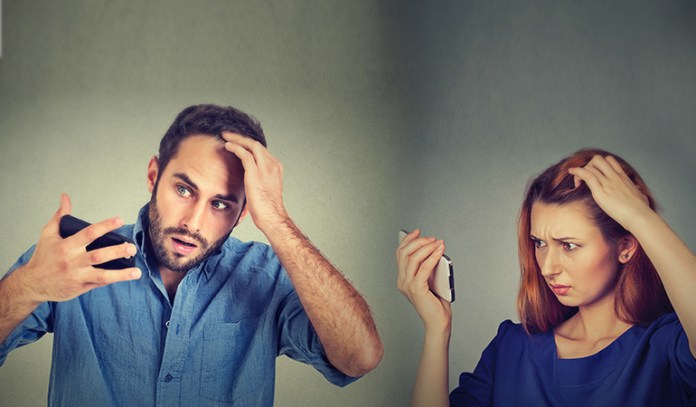In an age where presentation is everything, a healthy, beautiful crop of hair is much more than some mere strands of keratin. One could almost say it’s an extension of our personality. So we do all sorts of things to make our mane look it’s very best. Women twirl it, perm it, curl it, straighten it, and spray it with all sorts of mists to hold it in place. And men don’t fall far behind either, what with all those hair gels and waxes that find their place in the bathroom cabinet.
It all seems to be going fine for us and our hair. That is, until we accidentally unleash a thick bunch of what seems like incessantly falling strands. Which leaves you in hysterics, panicking over the fact that you may be turning bald. A millennial’s worst ever nightmare.
The good news is, it’s normal to lose some hair every now and then. But how much is normal, and how much is too much?
How Much Hair Fall Is Normal?

Trichologists say that it’s perfectly natural for everyone to lose anywhere between 60 to 100 strands of hair each day. On days designated especially for washing your hair, it’s normal to lose up to 250 strands.
If you’re someone who has long hair, this number can make it look like an entire tuft has fallen out, causing you to rush to a mirror to see if it has left a bald patch. If on the other hand, you have shorter hair, it can seem like a lot less. Either way, losing this much hair is completely normal and nothing to worry about.
How Much Hair Fall Is Too Much?

Are you waking up to a pillow covered in loose strands of hair? Do you find your comb with strands tangled within its teeth? Every time you run your hands through your hair, do your fingers pull away with a bundle of hair?
If your answer is in the affirmative, we’re sorry to say, you’re definitely losing too much hair.
Factors That May Cause Too Much Hair Fall

There’s a long list of factors that could be held responsible for this scary situation. You could be washing your hair too much, or styling your mane with all sorts of heating tools within the inch of its life. You could be using products that are a little too harsh on your scalp, or you could be lacking in some serious hair-friendly vitamins.
You could also blame it on your family genetics, or on your dysfunctional thyroid. Got a case of polycystic ovary syndrome (PCOS)? It’s probably wreaking havoc on your blood, which in turn is causing your hair to fall out.
Weather can also play a role in causing you too much hair fall. Some of us may even find ourselves losing too much hair in the summers, and far less in winters.
Things like hormonal imbalance and a sudden bout of excessive stress can also be responsible for you shedding too many of your pretty locks. If you’ve recently recovered from a high fever or an episode of stomach poisoning, you may see your hair falling out even six weeks later.
Does Hair Stop Growing After A Certain Length?

Yes, it does. Our hair grows about half an inch on an average each month. Once it reaches 10 inches, the rate of growth decreases to about one-fourth an inch per month.
However, this is just an overall average estimation. Everyone’s body is built differently, and while some may find their hair growing faster than this rough estimate while others may find their hair growing at a much slower rate. Some people may find their hair growing for a minimum of two years before shedding, while others may find their hair taking close to seven years of growth.
Is There A Way To Reverse Excessive Hair Fall?

Fortunately, yes. Once you recover from an illness, or an infection, all that hair will automatically stop falling out. Following the right hair care regime like oiling your hair regularly, washing your hair no more than twice or thrice a week, and keeping the use of styling tools and products to the minimum will also help reverse your excessive hair loss.
You can also follow a diet that’s rich in the right vitamins like omega-3 fatty acids, vitamin B, proteins, and antioxidants that can help you revive the quality of your mane. Follow this up with the right supplements (remember to consult your trichologist for this bit!) and within a few months, your hair will be flaunting a fabulous shine and healthy texture.
Is Baldness Reversible In Both Sexes?

Complete baldness is mostly genetic and there’s not much you can do about that, unfortunately. However, you can still use a variety of very effective treatments that combat balding and stimulate hair growth, to stop yourself from growing bald.
For women, the process is fairly simple and can be reversed by taking oral anti-androgen medication. This inhibits the action of the androgen hormones that are responsible for causing baldness in the first place (note that these are unsafe for women who are pregnant).
For men, unfortunately, taking anti-androgen medication is often not as straightforward, as these are not just specific to hair follicles and could potentially end up emasculating a man. However, there is a popular prescription drug called finasteride that is very effective in arresting the development of genetic hair loss, though some men may only accomplish partial regrowth.
It is usually recommended that if balding runs in the family, the hair treatment should be started as soon as possible. The earlier you start, the more hair you will have to protect!
Note: Always take the opinion of a doctor and a trichologist before proceeding with any kind of drugs, supplements, or treatment to combat baldness.





